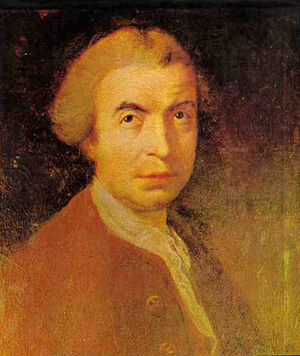Roger Joseph Boscovich (nonfiction): Difference between revisions
No edit summary |
No edit summary |
||
| Line 38: | Line 38: | ||
[[Category:Physicists (nonfiction)]] | [[Category:Physicists (nonfiction)]] | ||
[[Category:Poets (nonfiction)]] | [[Category:Poets (nonfiction)]] | ||
[[ | [[Category:Portraits (nonfiction)]] | ||
[[Category:Priests (nonfiction)]] | [[Category:Priests (nonfiction)]] | ||
[[Category:Theologians (nonfiction)]] | [[Category:Theologians (nonfiction)]] | ||
Revision as of 10:56, 11 February 2018
Roger Joseph Boscovich (Croatian: Ruđer Josip Bošković, pronounced [rûd͡ʑer jǒsip bôʃkoʋit͡ɕ], Italian: Ruggiero Giuseppe Boscovich; 18 May 1711 – 13 February 1787) was a Ragusan polymath from the city of Dubrovnik (modern-day Croatia): physicist, astronomer, mathematician, philosopher, diplomat, poet, theologian, and Jesuit priest.
He studied and lived in Italy and France, where he also published many of his works.
He was nicknamed the Croatian Leibniz by Werner Heisenberg.
He produced a precursor of atomic theory and made many contributions to astronomy, including the first geometric procedure for determining the equator of a rotating planet from three observations of a surface feature and for computing the orbit of a planet from three observations of its position.
In 1753 he also discovered the absence of atmosphere on the Moon.
In the News
Fiction cross-reference
- Crimes against astronomical constants
- Crimes against mathematical constants
- Crimes against physical constants
- Gnomon algorithm
- Mathematics
Nonfiction cross-reference
External links:
- Roger Joseph Boscovich @ Wikipedia
